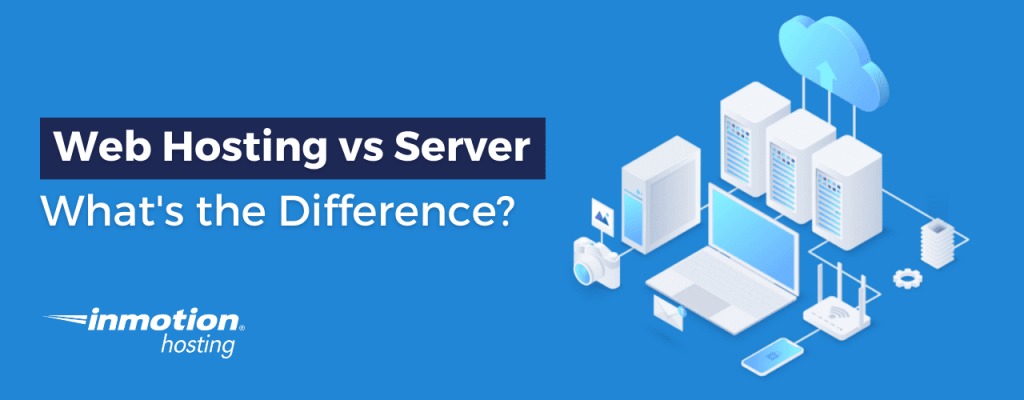
If you are new to web hosting, it can be confusing trying to figure out what the difference is between web hosting and a web server.
What does it have to do with your website going live?
Are there any requirements you need to follow to grow your online brand identity?
When it comes to web hosting vs server, it is important to understand that you need both in order to run your website efficiently. What really matters? Find a reliable and secure place to host your website.
Keep reading to learn the difference between web hosting and a web server, and how finding a good web host can solve all your hosting vs server problems.
What is a Web Server?

A web server is a piece of software or hardware that provides a service to devices in its network. Essentially, it’s a type of hosting service.
In terms of hardware, a server is a special computer that has the ability to host websites and web-based tools. Software-wise, a server is used as an adjective for a server operating system. It is intended to run on server applications.
Servers are used for managing and storing data, sharing resources, and delegating computations. Each web server has a unique IP address and a domain name.
The primary difference between web hosting and a web server is that a server can be connected to the internet or LAN, while the host needs to be connected to the internet.
Another difference between them is that a server will only share resources and services and the host can share and consume resources. Servers are used to host websites and contain one or more websites.
What is Web Hosting?

Web hosting is essentially the process of using a server to host a website. As far as hardware, refers to a computer or device that allocates space for users to store their files.
Also known as a hosting service, web hosting enables a website to be accessible to users via the internet. You need web hosting in order to have your website online. Companies that offer this service provide their server computers to store customer websites.
On top of making customer websites accessible via the internet, web hosting also provides high-quality security services to help protect customers and their valuable data from hackers and malware.
In short, a web hosting service offers the facilities required for users to create and maintain a website.
Types of Web Hosting
There are several different types of hosting available. The four main types of hosting options are:
- Shared Hosting: Perfect for beginners, small businesses, and freelancers. Shared hosting is when a website is stored on the same server as multiple other websites. All websites on that server share the same resources such as RAM, CPU cores, and bandwidth. Splitting resources helps keep the cost of shared hosting relatively low.
- VPS Hosting: If you need more resources than a shared hosting plan but don’t have the need for your own individual server, virtual private server (VPS) hosting is a great option. Like shared hosting, VPS hosting shares a physical server with other users. Each website is hosted within its own space on the server. VPS servers can still be affected by other sites on their server, but provide website owners with more storage space and customization options.
- Dedicated Hosting: With dedicated hosting, you are the only user on the server. All the resources belong to you, and your website is the only one housed on the server. Dedicated hosting gives site owners the most control of all the hosting options. You are the only website stored on a dedicated server. You will have full root and administrative access, meaning you can control everything from the operating system you use.
- Cloud Hosting: Cloud hosting is essentially a more cost-effective version of VPS hosting. With cloud hosting, plans come with multiple remote servers, and each of those servers has a different responsibility. This type of hosting is appealing because if one of the servers goes down or has a problem, other servers within the network will step up to take over those responsibilities. Cloud servers are also super scalable, meaning you can easily increase your server resources as your business grows. It is a great option for businesses growing at a quick pace.
The majority of hosting packages available for use are considered managed hosting options. With managed hosting, hosting companies handle things such as hardware and software setup, server configuration, maintenance, hardware replacement, technical support, patches, updates, and more.
Managed hosting plans are a great choice for users who don’t have a lot of technical experience and would rather leave those tasks up to the experts.
Other hosting options include:
- WordPress Hosting: Plans that have been optimized for those using WordPress as their content management system (CMS) are referred to as WordPress Hosting. This also includes added security specifically designed for WordPress websites.
- Reseller Hosting: Reseller hosting is for those who want to sell their own hosting services. Essentially white-label hosting, this type of hosting enables users to buy hosting from a provider and then resell it to their own clients with their own pricing options.
Web Hosting vs Server: What Really Matters

If you are searching web hosting vs server then what you probably want to know is what you need to do to have your own website.
The answer: choose the right web host and hosting plan. When considering what type of hosting to choose, it all depends on what type of website you have and what resources you need, as well as your budget, and site traffic.
A good-quality web host will take care of all the speed, security, and behind-the-scenes management of your website. They will also provide you with professional tools for easy website launch and website management.
With more than 570,000 satisfied customers across the globe, InMotion Hosting has been providing premium web hosting, tools, and support since 2001.
With InMotion Hosting, there are several things you can count on, such as:
- Exceptional uptime: When it comes to hosting, anything less than 99.95% uptime is considered unacceptable. InMotion Hosting maintains an uptime of 99.99% in order to guarantee your website’s accessibility.
- First-class security: One of the biggest dangers to your website is the threat of cyber-attacks and malware assaults. A great web hosting provider like InMotion Hosting will provide firewall and malware-scanning software, encrypt your data, including a free SSL certificate, and constantly monitor its networks.
- 24/7/365 support: When your website experiences an issue, you shouldn’t have to wait to resolve it. No matter the time, InMotion Hosting is number one in customer support, with our own in-house team at your disposal.
Wrapping up
InMotion Hosting plans are backed by an industry-leading 90-day money-back guarantee. What does this mean for you? Well, you have a full three months to test out your hosting plan to make sure it is right for you.
With the right web host and plan, you’ll never have to worry about your host or your server again. No matter what kind of hosting you need, InMotion Hosting has all the tools, features, and support to successfully host your own website.
They specialize in finding individuals and businesses the hosting plan best suited to their needs. Plus, with 24/7/365 support, you can rest assured InMotion Hosting will have your back as your business continues to grow.







